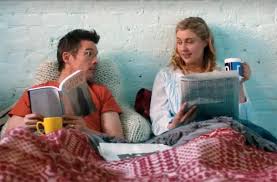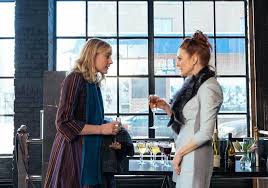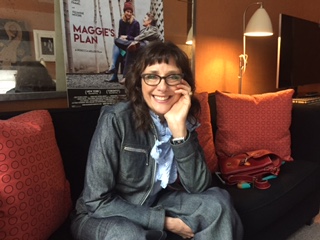
[caption id="attachment_52058" align="alignleft" width="277"] Maggie (Greta Gerwig) and John (Ethan Hawke).[/caption]
Maggie (Greta Gerwig) and John (Ethan Hawke).[/caption]
By Danny Peary
Maggie’s Plan fits my category Movies That Should Play in Sag Harbor. After premiering in May, Rebecca Miller’s new film starring indie favorite Greta Gerwig goes nationwide this Friday, including at the UA East Hampton 6. Miller, the daughter of playwright Arthur Miler, continues to carve out a name for herself. In addition to two acclaimed novels and a collection of short stories, she has now written and directed five feature films, including The Ballad of Jack and Rose, starring her husband Daniel Day-Lewis, and, adapted from her book, The Private Lives of Pippa Lee, starring Robin Wright. Her fifth, adapted from an unpublished novel by Karen Rinaldi, Maggie’s Plan is her first comedy. The New York Times called it “a serious screwball comedy.” The synopsis from the press notes: “Greta Gerwig portrays Maggie Hardin, a vibrant and practical thirty-something New Yorker working at the New School who, without success in finding love, decides now is the time to have a child on her own [accepting a sperm donation from a college acquaintance, Guy, a kind but somewhat spacey pickle salesman played by Travis Fimmel].
[caption id="attachment_52057" align="alignright" width="268"] Maggie (Greta Gerwig) and Georgette (Julianne Moore).[/caption]
Maggie (Greta Gerwig) and Georgette (Julianne Moore).[/caption]
But when she meets John Harding (Ethan Hawke), a ‘ficto-critical anthropologist’ and struggling novelist, Maggie falls in love for the first time, and adjusts her plans for motherhood. Complicating matters, John is in a strained marriage with Georgette Nørgaard (Julianne Moore) a brilliant Danish academic. With a Greek chorus of Maggie’s eccentric…best friends Tony and Felicia (Bill Hader and Maya Rudolph) observing wryly from the sidelines, Maggie sets into motion a new plan that catapults her into a nervy love triangle with John and Georgette; intertwining their lives and connecting them in surprising and humorous new ways. Maggie learns that sometimes destiny should be left to its own devices.” Prior to its New York release I spoke to the amiable Rebecca Miller about her new movie.
[embed]https://www.youtube.com/watch?v=XbJ49IUyCcA[/embed]
Danny Peary: While watching Maggie's Plan, I thought of it as a farce. Then I read a piece written during the Toronto Film Festival that labeled your film “a screwball comedy.” Would you consider your film that?
Rebecca Miller: I looked at a number of forms that are all connected. I read French farces from the 18th century. I looked at A Midsummer Night’s Dream. I definitely looked at screwball comedies from the 1940s. And many more films than that. So I had a lot of influences. Screwball comedy and farce are both appropriate.
[caption id="attachment_52060" align="alignleft" width="320"] Rebecca Miller. Danny Peary photo[/caption]
Rebecca Miller. Danny Peary photo[/caption]
DP: There’s actually a division of screwball comedies called "remarriage films."
RM: Yes, I’m familiar with those, but to be honest I didn’t know that there was a genre of them. I definitely looked at Philadelphia Story quite carefully, The Awful Truth, His Girl Friday.
DP: In the press notes, you talk about how happy you were to do a comedy. Is there pain in this one too?
RM: You can sort of see it, I guess. But I saw it from a different lens. You could have made this story as a dramatic story.
DP: I agree that the exact script could have been made into a film without laughs.
RM: Right, but with a different rhythm and timing and outlook. The key to good comedic acting is that it’s emotionally real. If it’s going to be emotionally real and bad things happen, people are going to react with real emotions.
DP: The tone of your film is different. It’s kind of a risk, I think, that you don't go extreme screwball or to heavy drama, but keep it somewhere in between.
RM: Exactly. It has an unusual tone. It is risky but Risk is my middle name.
DP: I watched an interview in which you said that with Pippa Lee,we can slowly peel away a little more about her as the film progresses until we get a clear picture of who she is. Is Maggie a quick study? Do we know her right away?
RM: I think she’s complex. But I think you know one thing about her right away. The first thing you see is that she helps a blind man cross the street. Since she’s about to do so many naughty things, I figured it would be smart to show that she’s a good person before she starts messing up everybody. She’s not a narcissistic person. She’s definitely a person who tries to look on the bright side but she also has a great wound in her, too. One of my favorite moments is when she describes her relationship with her mother and her mother’s death. She recovers from it so quickly. She lets herself go there and is surprised that she is revealing that much of herself--sometimes you have a real connection with someone and are much more vulnerable and open than you thought you'd be--but then she bounces back and she asks about the other person. That makes me love her. She is motivated to control her own destiny--it has to do with destiny having dealt a blow to her.
DP: I love your quote “Destiny works better in retrospect.” Why do you feel that in regard to Maggie.
RM (laughing): In general, what I meant was when we look back on our lives, especially when we've lived longer, things start to fall into a novelistic pattern and look like destiny. You start to say, “Oh, yeah, this is the man I was meant to meet because I had a baby with him.” Then you start to see the sense in what looked like chaos from the beginning. When you start out living your life, it seems like that it is made up of one random thing after another. Then you look back on it and there seems to be some kind of logic and pattern.
DP: Did Maggie have a plan since she was a little kid, and her having a baby is just the latest of her plans?
RM: Yeah. She planned out her education. How to find a career that suited her character. I think she’s living a very thoughtful life. She subletting in a nice neighborhood in Manhattan for probably much less money than you would normally have to pay. She wears vintage clothing partly so she can look good but also doesn’t have money to have a whole wardrobe. She lives within her means. You can feel that this is a girl that knows what it is to support herself and how to take care of herself. She’s had to do that for a long time. I found it touching that she was sorting the bills when she was twelve years old. That’s somebody who’s a special kind of character.
DP: Greta Gerwig is great at playing earnest characters, well-meaning characters, and, like what you just said, resilient characters. You cast her a year ahead of filming. Was this your conversation with her in trying to get to who Maggie is?
RM: There was a sense that Greta understood the character in an instinctive way, just from talking to her from the start. I guess we didn't start so big. It wasn’t really a conceptual conversation that we had, but more about all the details that make up a person and all the contradictions that make up a person. In regard so Maggie's many characteristics, Greta really built that character. We did talk about her great romance. She's sort of bowled over by John and all her plans go out the window. Because it’s a big sexual awakening for her and she feels this excitement that she hasn’t felt for a person. We wanted to get across that she's a modest person and isn't most experienced person, although she has had relationships.
DP: Were all her relationships disappointing?
RM: The way I see it is: She had a relationship with Tony [Bill Hader], which was two years long and the longest relationship she ever had. I think they were lovers who became like brother and sister, which happens when you just know someone too well and gradually you become related. After that it’s been one brief relationship after the other for Maggie and she really hasn’t latched on to anyone. No one has taken root in her heart. So she starts thinking, “Well, I really feel ready to be a mother.” She's one of those people. My best friend had that feeling when she was 30 years old. She said, "I want to have a baby, I want to be a mother. One of the reasons that the chapters that Karen Rinaldi sent me were so resonate was that I knew people in similar situations. It was in the air.
DP: I read where you said you couldn't imagine doing it yourself.
RM: Having a baby by myself? I would not have had kids, personally. But everybody has a different connection. I know people who want to have a baby just no matter what--and that's the department that Maggie's in.
DP: At the age of thirty, she is ready to have a baby, but at this time she meets John and has, basically, her high school crush. And he proves to be a disappointment—like Warren Beatty is to Natalie Wood when she visits him years after high school in Splendor in the Grass. Do you see John as a type?
RM: You can say all the characters are types. For instance, you could write off Georgette as a type, but she's certainly more on an individual than that. What’s interesting to me is what is beyond type. I don’t know if John is a type. I don’t see him like that but maybe because I feel like I know him so well. .
DP: Did Ethan Hawke ever say that John is a great guy?
RM: No, and the thing that made his performance so special is that he played him without any vanity. He didn’t try and save him from the confusion, the narcissism or his childlike quality. He played all of that and in a way, the generosity in which he played the character somehow for me saves the character and makes him more likeable and more acceptable as I watch the film. John’s not a bad guy.
DP: You talked about Maggie doing naughty things and messing up people's lives and even breaking up a marriage. But is Maggie really a flawed character? She seems almost perfect, and is nurturing to everybody, which is why everybody likes her.
RM: It’s funny because you can look at her as totally perfect or you can look at her as very flawed. It depends on your perspective. She’s definitely somebody who tries to bring out the best in other people’s lives and other people. In doing so, she can seem like a bossypants.
DP: Everyone lets her do things because she does them so efficiently.
RM: She’s extremely capable and so she tends to take up a lot of slack in other people’s lives as well.
DP: I know you got this story from someone else, but when watching this movie I kept thinking that when you were writing the script you became curious about what would happen if you took these three stand-alone characters, Maggie, John, and Georgette, and mixed their stories together into a certain situation.
RM: What Karen Rinaldi bestowed on me by sending those chapters was sort of this beautiful geometry that became the skeleton that I was able to lay the flesh of the story on. Some of the characters already were in existence in relation to each other, but there was no Tony and Felicia [Maya Rudolph]. There was no Pickle Man [Travis Fimmel]. In some ways the plot was very condensed because there were only a few chapters of a much larger book--which will be published in a year. I always try to write people so they are interesting enough to have their own movie, and I definitely ended up becoming really fascinated by them as individuals. And because the plot needed to be built out so much, a lot of the work became, “What would that person do?” I try not to use characters in a manipulative way, and it’s a particularly difficult thing when there’s form that has certain requirements. This form has some demands on it. It’s sort of an "all's-well that-ends-well" situation and how do you get to that place? You could end this movie in so many ways but if you know that you have to get to a place of pleasure, which I really wanted to do from the start, how do you get there in an honest way?
DP: That's what I thought when watching your film--you were curious how it would work out.
RM: Exactly. That meant going down blind alleys. A crazy thing happened. At what point in the writing, Maggie and Georgette had an affair. I decided that was way too much! All sorts of things happened, but then I'd pull back and say, "That's not this movie. Maggie wouldn't go there." You go really far in one direction and you pull back but you're left with residue of that moment. Like when Georgette says, "It's easy to get my number." There's almost a seductiveness to Georgette, because she can't help seducing everybody who happens to walk by. That's what she does, and even Maggie falls under her spell. She has a little crush on her when she sees her in the bookstore, thinking, "Oh, my god, she's so great!" She's a young woman seeing an older woman and thinking, "She's so cool."
DP: You also were in tune with why a male would be attracted to Greta Gerwig. She has that unconventional appeal that makes everyone like her, especially when you have Maggie dancing around the apartment unaware John is gazing at her.
RM: Right! She's very disarming and attractive.
DP: Why did you make the film about a younger woman rather than make a film about Georgette, who’s your age?
RM: The chapters that were sent to me did have Maggie as more of a protagonist than Georgette. So I took that. One of the nice things about being a writer is that it’s very fluid. You can change sex, you can change age. You can write young or old. You can hide yourself anywhere and no one needs to know. You can be in the male or female character. Not that these characters are me but for me to really write a character, I usually use some part of myself. For Maggie, I definitely was able to lend her some parts of me but having said that, the creation of her came from a deep collaboration with Greta. Not so much the dialogue--I wrote the dialogue score, if you will--but who she is in a very deep way. Like she's a Quaker--that is something we came up with together. We were able to let each other come inside our circles. A circle is very often is discrete and you can't let anyone in. Being in there together was a very rare and special thing. It gets to a point when you’re collaborating with somebody in a deep way that the lines begin to blur in terms of who came up with what. That’s a wonderful moment because it’s like you’re gifting each other stuff.
DP: Could you hang out with these characters?
RM: Oh, yeah. I’d love to be really close friends with Maggie. And I think Tony and I would be quite close. He’s based on one of my best friends. He’s cranky but so loving. He loves Maggie so much. To me, he’s the kind of person that would give his life for someone else but he’s a grump. Sometimes the people that seem thorny are actually the best hearted people.
DP: Your film deals with second families, fertility clinics, single women wanting to raise kids. Is this a film about today?
RM: Yes. For me it’s very much a message in a bottle. We’ll put it in the river and 20 years from now people will say, “Oh, they put butter in their coffee and they had fertility apps.” So yes, I think of it as our very contemporary confusion.
I also recommend King Jack, which opens in NYC this Friday. Here’s the link to my April 2015 interview for Sag Harbor Express Online with its director Felix Thompson a few days before his film won the Audience Award at the Tribeca Film Festival: https://sagharborexp.wpengine.com/felix-thompsons-king-jack-is-crowned-tffs-favorite-film/